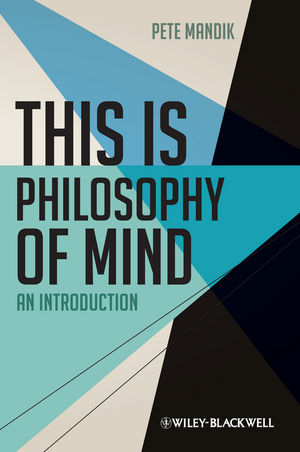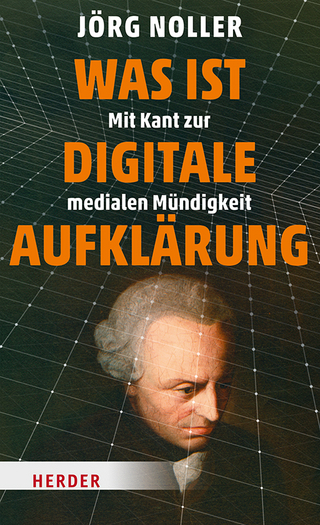
This is Philosophy of Mind
Wiley-Blackwell (Verlag)
978-0-470-67447-5 (ISBN)
This is Philosophy of Mind presents students of philosophy with an accessible introduction to the core issues related to the philosophy of mind.
Includes issues related to the mind-body problem, artificial intelligence, free will, the nature of consciousness, and more
Written to be accessible to philosophy students early in their studies
Features supplemental online resources on https://www.wiley.com/en-us/thisisphilosophy/thisisphilosophyofmindanintroduction and a frequently updated companion blog, at http://tipom.blogspot.com
Pete Mandik is Professor of Philosophy at William Paterson University, New Jersey. He is the author of Key Terms in Philosophy of Mind (2010), co-author of Cognitive Science: An Introduction to the Mind and Brain (2006), and co-editor of Philosophy and the Neurosciences: A Reader (2001).
How to Use This Book xv
Acknowledgments xvii
1 Meet Your Mind 1
Aspects of Mind 1
Thought and experience 1
Conscious and unconscious 2
Qualia 3
Sensory perception 3
Emotion 4
Imagery 4
Will and action 5
Self 5
Propositional attitudes 5
Philosophical Problems 6
Mind–body problem 7
Other problems 9
Conclusion 14
Annotated Bibliography 14
2 Substance Dualism 15
Arguments for Substance Dualism 15
Leibniz’s law arguments 16
Criticism of Leibniz’s law arguments: Intensional fallacy 19
Explanatory gap arguments 20
Criticisms of explanatory gap arguments 21
Modal arguments 22
Criticism of the modal arguments: Does conceivability eally entail possibility? 23
Mind–Body Interaction as a Problem for Substance Dualism 24
Princess Elisabeth’s objection 25
The dualistic alternatives to Cartesian interactionism 26
Conclusion 27
Annotated Bibliography 28
3 Property Dualism 29
Introducing Property Dualism: Qualia and the Brain 29
The Inverted Spectrum 30
Attack of the Zombies 32
The Knowledge Argument 34
The Explanatory Gap Argument 37
Does Property Dualism Lead to Epiphenomenalism? 39
How Do You Know You’re Not a Zombie? 41
Conclusion 42
Annotated Bibliography 42
4 Idealism, Solipsism, and Panpsychism 45
Solipsism: Is It Just Me? 46
Idealism: It’s All in the Mind 50
Berkeley’s argument from pain 51
Berkeley’s argument from perceptual relativity: Berkeley’s bucket 51
Berkeley’s “Nothing but an idea can resemble an idea” 52
Berkeley’s master argument 52
Why Berkeley is not a solipsist 53
Arguing against idealism 53
Panpsychism: Mind Is Everywhere 54
The analogy argument 55
The nothing from nothing argument 56
The evolutionary argument 57
Arguing against panpsychism: The combination problem 57
Conclusion 58
Annotated Bibliography 59
5 Behaviorism and Other Minds 61
Behaviorism: Introduction and Overview 61
The History of Behaviorism 63
Ludwig Wittgenstein and the private language argument 64
Gilbert Ryle versus the ghost in the machine 66
Objections to Behaviorism 67
The qualia objection 67
Sellars’s objection 68
The Geach–Chisholm objection 69
The Philosophical Problem of Other Minds 70
The rise and fall of the argument from analogy 71
Denying the asymmetry between self-knowledge and knowledge of other minds 72
Conclusion 73
Annotated Bibliography 74
6 Mind as Brain 77
Introducing Mind–Brain Identity Theory 77
Advantages of Mind–Brain Identity Theory 78
A Very Brief Overview of Neuroscience 79
Major parts and functions of the nervous system 80
Major parts and functions of the brain 80
Neurons, neural activations, and brain states 81
Lesions, imaging, and electrophysiology 81
Localism and holism 81
Learning and synaptic plasticity 82
Computational neuroscience and connectionism 82
Neural correlates of consciousness 83
On pain and c-fi bers 83
Some General Remarks about Identity 84
Arguments against Mind–Brain Identity Theory 86
The zombie argument 86
The multiple realizability argument 87
Max Black’s “distinct property” argument 89
Conclusion 90
Annotated Bibliography 91
7 Thinking Machines 93
Can a Machine Think? 93
Alan Turing, Turing Machines, and the Turing Test 94
Alan Turing 95
Turing machines 95
The Turing test 96
Searle’s Chinese Room Argument 97
Responses to the Chinese Room Argument 98
The Silicon Chip Replacement Thought Experiment 99
Symbolicism versus Connectionism 102
Conclusion 105
Annotated Bibliography 106
8 Functionalism 109
The Gist of Functionalism 109
A Brief History of Functionalism 111
Arguments for Functionalism 112
The causal argument 112
The multiple realization argument 114
The Varieties of Functionalism 117
Turing machine functionalism 117
Analytic functionalism versus empirical functionalism 118
Arguments against Functionalism 119
Adapting the zombie argument to be against functionalism 120
Adapting the Chinese room argument to be against functionalism 121
Conclusion 122
Annotated Bibliography 122
9 Mental Causation 123
The Problem of Mental Causation 123
The causal closure of the physical 124
The problem for substance dualists 126
The problem for property dualists 126
Basic Views of Interaction 127
Interactionism 127
Parallelism 128
Epiphenomenalism 129
Reductionism 130
Qualia and Epiphenomenalism 130
Whether qualia-based epiphenomenalism conflicts with phenomenal self-knowledge 131
Dennett’s zimboes 131
Anomalous Monism 132
The Explanatory Exclusion Argument 136
Conclusion 137
Annotated Bibliography 137
10 Eliminative Materialism 139
Introduction and Overview 139
Basic Ingredients of Contemporary Eliminative Materialism 140
Folk psychology as a theory 141
The contrast between reduction and elimination 142
Putting the ingredients together 143
Arguments for Propositional Attitude Eliminative Materialism 143
Folk psychology is a stagnant research program 144
Folk psychology is committed to propositional attitudes having a sentential structure that is unsupported by neuroscientific research 144
Folk psychology makes commitments to features of mental states that lead to an unacceptable epiphenomenalism 145
Arguments against Propositional Attitude Eliminative Materialism 145
Eliminative materialism is self-refuting 146
The “theory” theory is false 146
Folk psychology is indispensable 147
Introspection reveals the existence of propositional attitudes 148
Qualia Eliminative Materialism: “Quining” Qualia 149
Conclusion 152
Annotated Bibliography 153
11 Perception, Mental Imagery, and Emotion 155
Perception 155
Direct realism and the argument from illusion 155
Philosophical theories of perception 158
Mental Imagery 161
How similar are mental images to other mental states? 162
Is mental imagery the basis for mental states such as thoughts? 163
To what degree, if any, is mental imagery genuinely imagistic or picture-like? 163
Emotion 165
What distinguishes emotions from other mental states? 166
What distinguishes different emotions from each other? 167
The difficulties in giving a unifi ed account of the emotions 167
Conclusion 168
Annotated Bibliography 168
12 The Will: Willpower and Freedom 171
The Problem of Free Will and Determinism 171
Sources of Determinism 173
General remarks 173
Physical determinism 174
Theological determinism 175
Logical determinism 175
Ethical determinism 176
Psychological determinism 176
Compatibilism 177
Incompatibilism 178
The origination or causal chain argument 179
The consequence argument 180
What Might Free Will Be, If There Were Any Such Thing? 181
Freedom aside for the moment, what is the will? 181
What might the freedom of the will consist in? 183
Conclusion 185
Annotated Bibliography 185
13 Intentionality and Mental Representation 187
Introducing Intentionality 187
The Inconsistent Triad of Intentionality 188
Defending each individual proposition 189
Spelling out the inconsistency 190
Internalism versus Externalism 190
For externalism: The Twin Earth thought experiment 192
Against externalism: Swampman and the brain in the vat 193
Theories of Content Determination 194
Resemblance theory 194
Interpretational semantics 195
Conceptual role semantics 196
Causal or informational theory 198
Teleological evolutionary theory 199
Conclusion 200
Annotated Bibliography 200
14 Consciousness and Qualia 203
Optimism about Explaining Consciousness 203
Focusing on Several Different Uses of the Word “Conscious” 204
Creature consciousness 204
Transitive consciousness 204
State consciousness 205
Phenomenal consciousness 205
Rosenthal’s Higher Order Thought Theory of Consciousness 206
An objection to the HOT theory: Introspectively implausible 209
Another objection to the HOT theory: Too intellectual 209
First Order Representation Theories of Consciousness 211
The transparency argument for first order representationalism 213
The “Spot” argument for fi rst order representationalism 214
Conclusion 214
Annotated Bibliography 215
15 Is This the End? Personal Identity, the Self, and Life after Death 217
Problems of Personal Identity 217
The Problem of Persistence 219
Approaches to the Problem of Persistence 220
The psychological approach 220
The fission problem for the psychological approach 221
The somatic or bodily approach 222
Temporal parts theory aka perdurantism aka four-dimensionalism 224
The no-self view 225
Life after Death 227
Substance dualism and the afterlife 228
Mind–brain identity theory and the afterlife 228
Functionalism and the afterlife 229
Temporal parts and the afterlife 229
No-self and the afterlife 230
Conclusion 230
Annotated Bibliography 230
Index 233
| Reihe/Serie | This is Philosophy |
|---|---|
| Verlagsort | Hoboken |
| Sprache | englisch |
| Maße | 159 x 238 mm |
| Gewicht | 463 g |
| Themenwelt | Geisteswissenschaften ► Philosophie |
| ISBN-10 | 0-470-67447-4 / 0470674474 |
| ISBN-13 | 978-0-470-67447-5 / 9780470674475 |
| Zustand | Neuware |
| Informationen gemäß Produktsicherheitsverordnung (GPSR) | |
| Haben Sie eine Frage zum Produkt? |
aus dem Bereich


